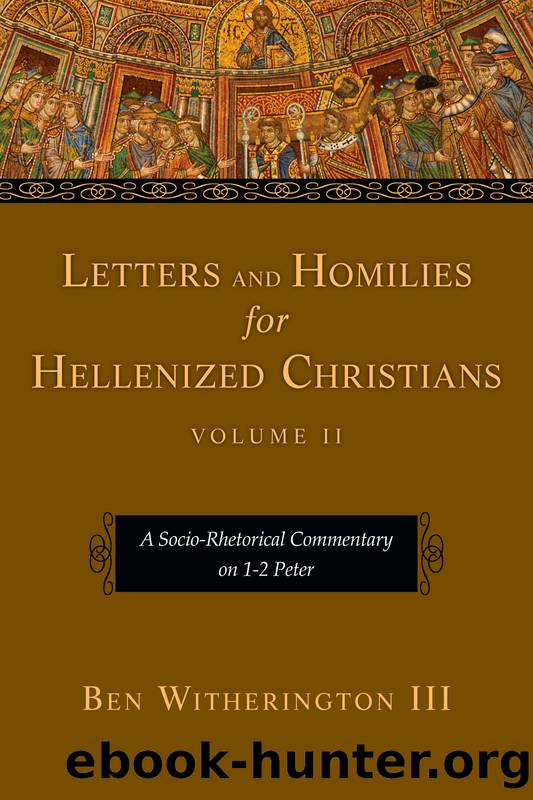Letters and Homilies for Hellenized Christians by Witherington III Ben;

Author:Witherington III, Ben; [Witherington III, Ben]
Language: eng
Format: epub
Publisher: InterVarsity Press
Published: 2016-08-15T00:00:00+00:00
BRIDGING THE HORIZONS
First Peter is a rich and diverse book, which provides lots of material for good preaching and teaching. Sadly, when it is not being entirely neglected, it seems mostly to be used as cannon fodder for the assumption that the author was an unreconstructed oppressor of women and slaves, hidebound to the fallen conventional cultural values of his age. Fortunately, as we have sought to show in this commentary, this is by no means true, but few seem prepared to listen. Once buzzwords or phrases like âthe weaker sexâ or âslaves obey even abusive mastersâ begin to be bandied about, it is hard to convince those who are not already convinced that on such subjects 1 Peter stands with, rather than against, the more enlightened views of Jesus, Paul and other early Christians. Completely ignored in such discussions is Peterâs emphatic exhortation to âlive as free peopleâ but to use their freedom responsibly, acting as servants of God (1 Pet 2:16). Equally underappreciated are Peterâs statements about mutual submission in the body of Christ, indeed submission, by which is meant deference and respect and service to âevery human creatureâ (2:13). And when one sees the strong stress on women being coheirs of grace immediately after the reference to physical weakness (1 Pet 3:7), and the exhortations to husbands to behave accordingly, it becomes quite impossible to paint Peter into the male chauvinist corner.
Equally unhelpful are some of the usual treatments of what 1 Peter says about kings and governors, as if Peterâs call to suffering were some tacit endorsement of governments behaving badly, or worse, even a call to masochism. But Peter says nothing about seeking out suffering. He sounds nothing like later overly eager Christians yearning for martyrdom (e.g., Ignatius of Antioch). Rather, 1 Peter seeks to prepare the audience for the worst the world can do, all the while helping the audience to live in the light of Godâs grace, knowing that the resurrection makes clear that Godâs yes to life is louder than the persecutors or even deathâs no. And Christ, who is coming back, will indeed have the last word.
In my own evangelical context, I suspect that one of the reasons why interpreters have avoided 1 Peter is because it has been one of the pet texts that Reformed exegetes have used to prove the Calvinistic approach to the doctrine of election and predestination. Yet 1 Peter surprisingly says nothing about individuals being selected to be saved quite apart from their own will or wishes. The entire discussion of election in this book has to do with a corporate concept of election. Christ is the elect one, whom God has chosen in advance, as 1 Peter 1:20-21 makes very apparent, and if one is âin Christ,â one is in the group of the Chosen One. Furthermore, as 1 Peter 1:2 stresses, Godâs choosing is done on the basis of what he knows, or more precisely what he foreknows about those in question. His choice is not arbitrary, and it indeed has to do with something he knows about those who respond in faith.
Download
This site does not store any files on its server. We only index and link to content provided by other sites. Please contact the content providers to delete copyright contents if any and email us, we'll remove relevant links or contents immediately.
| New Testament | Old Testament |
The Five People You Meet in Heaven by Mitch Albom(2855)
Name Book, The: Over 10,000 Names--Their Meanings, Origins, and Spiritual Significance by Astoria Dorothy(2500)
Real Sex by Lauren F. Winner(2489)
The Holy Spirit by Billy Graham(2435)
The Secret Power of Speaking God's Word by Joyce Meyer(2264)
0041152001443424520 .pdf by Unknown(2231)
How The Mind Works by Steven Pinker(2229)
ESV Study Bible by Crossway(2152)
Ancient Worlds by Michael Scott(2113)
The Meaning of the Library by unknow(2079)
The Gnostic Gospels by Pagels Elaine(2041)
Churchill by Paul Johnson(2019)
MOSES THE EGYPTIAN by Jan Assmann(1981)
The ESV Study Bible by Crossway Bibles(1970)
Jesus by Paul Johnson(1895)
Ancient Near Eastern Thought and the Old Testament by John H. Walton(1857)
The Nativity by Geza Vermes(1855)
The Complete Dead Sea Scrolls in English (7th Edition) (Penguin Classics) by Geza Vermes(1852)
City of Stairs by Robert Jackson Bennett(1842)
